SERMONS IN CANDLES:
BYC. H. SPURGEON.
Lecture 2
Continued...............Part 2
Some excellent persons have very little talent indeed. It is not merely that there is a want of education, but there is a want of capacity. Now, when that happens to be the case, my next illustration may be a serviceable hint. On this board we have fixed a number of very small candles; and as they are all well alight, the result is by no means unsatisfactory. As a company of illuminators they make a pleasant and notable shining,
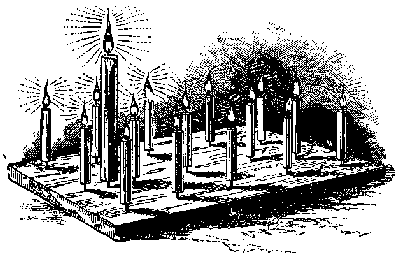 and I note that the children present are greatly pleased with their brightness. Let us observe how a number of good little people, well lighted by grace, can, by combination, really give out a great deal more illumination than far greater persons who shine alone. If one of you cannot do much in a place by yourself, look up other friends, start a Sunday-school, and all of you work together. You may do great things by earnest unity. Form a little army for preaching in the street. Band together to visit from house to house. Scatter tracts over the whole area by concerted action. Unity is light. Even children, youths, and maidens may make a great blaze by working together in the holy cause. But you must each one of you shine your quota, and no one must try to save his candle, and take things easy. All at it, and always at it, and you will not labour in vain. Yonder great ecclesiastical candle has never given a tenth of the light of these little instruments; nor would he, I fear, if I were now to set him burning. The unanimous services of the lesser members of our churches might suffice to light up our country, and the world itself, by the blessing of God.
and I note that the children present are greatly pleased with their brightness. Let us observe how a number of good little people, well lighted by grace, can, by combination, really give out a great deal more illumination than far greater persons who shine alone. If one of you cannot do much in a place by yourself, look up other friends, start a Sunday-school, and all of you work together. You may do great things by earnest unity. Form a little army for preaching in the street. Band together to visit from house to house. Scatter tracts over the whole area by concerted action. Unity is light. Even children, youths, and maidens may make a great blaze by working together in the holy cause. But you must each one of you shine your quota, and no one must try to save his candle, and take things easy. All at it, and always at it, and you will not labour in vain. Yonder great ecclesiastical candle has never given a tenth of the light of these little instruments; nor would he, I fear, if I were now to set him burning. The unanimous services of the lesser members of our churches might suffice to light up our country, and the world itself, by the blessing of God.Still, if we had an equal number of larger candles, we should have a brighter blaze. How often have I wished that men of great parts, position, and wealth, were brought into the service of our Lord! Perhaps we do not pray sufficiently for them; or possibly, if we had them, we might place too much reliance upon them. Yet the soul of a gentleman of influence is as precious as that of a poor man; and we should know no difference of grades in our prayers. If any among my audience are endowed with ten talents, they have ten good reasons for yielding themselves to the service of God. How can they do better with themselves than by serving the purpose of their Creation and Redemption! May almighty grace bring in some who will be great lights in this dark age! We need men fitted to be leaders; may the Lord send them soon!
This candle hanging on the wall, all mouldy and perishing, may serve as a striking likeness of those who have done
 nothing for their God, or for their fellow men. It is better to be consumed in shining than to perish ignominiously in doing nothing. I need scaredy quote the old proverb, "It is better to wear out than to rust out." Idleness is a destroyer. For every evil brought upon us by excessive labour, ten will come to us by laziness. Our accidents happen in our holidays. When the pot is not boiling the flies will come to it.
nothing for their God, or for their fellow men. It is better to be consumed in shining than to perish ignominiously in doing nothing. I need scaredy quote the old proverb, "It is better to wear out than to rust out." Idleness is a destroyer. For every evil brought upon us by excessive labour, ten will come to us by laziness. Our accidents happen in our holidays. When the pot is not boiling the flies will come to it.
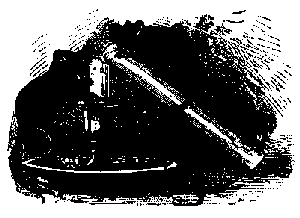 Mice will not nibble a lighted candle; but when the fire is gone, they find tallow a rather toothsome article. Who cares to be eaten by mice? Who wishes to die of the miserables? Who would like to be eaten up with whims, or nibbled away by crotchets? If we have no such desire, let us accept that sacred fire which will cause us to yield up our whole being to fire hallowed purpose of light-giving. For this we are kept in this dark world. We must be burning and shining lights, or we miss our vocation. Truly, he that saves his life loses it, and only he who spends his life for God shall find it unto life eternal.
Mice will not nibble a lighted candle; but when the fire is gone, they find tallow a rather toothsome article. Who cares to be eaten by mice? Who wishes to die of the miserables? Who would like to be eaten up with whims, or nibbled away by crotchets? If we have no such desire, let us accept that sacred fire which will cause us to yield up our whole being to fire hallowed purpose of light-giving. For this we are kept in this dark world. We must be burning and shining lights, or we miss our vocation. Truly, he that saves his life loses it, and only he who spends his life for God shall find it unto life eternal.
Have you over heard of a person who, in real earnest, did the very foolish thing which I am attempting in pretence! I have a candle here, and I want to light it. What shall I do?
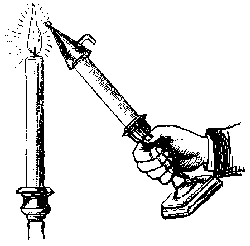 Before me I see a candle burning very brightly, and I will take a light from it for this other candle. I have not succeeded. How is it that I have altogether failed? I am of a very persevering turn of mind; I will give it a fair trial. I cannot succeed in lighting my candle, and you are all laughing at me, and you whisper that I must be over-much stupid to try to light a candle while an extinguisher is upon it. I subside. Do you not thlnk that very many persons go with an extinguisher on to hear a minister preach? Listen to yonder young lady:- "Well, I will go to hear him, Mary Anne, because you press me, but I am sure I shall not like him." Is she not very like a candle covered with an extinguisher? Why our nameless friend does not like the preacher she has not told us; but probably her prejudice will be the more intense in proportion as she is unable to give a reason for it. Prejudice is a blind and deaf judge, who decides a case before he has seen or heard the evidence. "Hang them first, and try them afterwards," is one of his sage observations. Remember the old lines about unreasonable dislikes:--
Before me I see a candle burning very brightly, and I will take a light from it for this other candle. I have not succeeded. How is it that I have altogether failed? I am of a very persevering turn of mind; I will give it a fair trial. I cannot succeed in lighting my candle, and you are all laughing at me, and you whisper that I must be over-much stupid to try to light a candle while an extinguisher is upon it. I subside. Do you not thlnk that very many persons go with an extinguisher on to hear a minister preach? Listen to yonder young lady:- "Well, I will go to hear him, Mary Anne, because you press me, but I am sure I shall not like him." Is she not very like a candle covered with an extinguisher? Why our nameless friend does not like the preacher she has not told us; but probably her prejudice will be the more intense in proportion as she is unable to give a reason for it. Prejudice is a blind and deaf judge, who decides a case before he has seen or heard the evidence. "Hang them first, and try them afterwards," is one of his sage observations. Remember the old lines about unreasonable dislikes:--
The reason why I cannot tell;
But this I know, and know full well,
I do not like you, Dr. Fell."
Just so. That is a very effective extinguisher.
Our young lady friend showed the prejudice of ignorance, but there is such a thing as the prejudice of learning, and this is a very effectual extinguisher. Dr. Taylor, of Norwich, once said that he had read the Bible through -- I think it was ten times -- and he could not anywhere find the Deity of Christ in it. Honest John Newton observed, "Yes, and if I were to try ten times to light a candle with an extinguisher on it, I should not succeed." Once make up your mind to refuse a doctrine or a command, and you will not see it where God himself has written it as with a sunbeam. Kick against a truth, and the arguments for it will seem to have no existence. Let prejudice of any sort wholly cover the candle of your mind, and, whatever you do, there is no likelihood of your receiving the light. There are none so deaf as those who will not hear. The country people say that "some are like the hogs in harvest, that can hear and won't." Of course, hogs are deaf when they are called out of a field where there is plenty to eat; and of course sinners are deaf when we bid them quit the pleasures of sin. This prejudice makes men totally blind. How can we perceive anything lovable where we have resolved to hate? How can we see even the sun itself when a dark body comes between us and him? How can men believe in the Lord Jesus when they are such great believers in themselves?
The only case in which I am willing to bear with prejudice is when a dislike of me leads people to watch the more carefully what I have to say. If they will during a sermon be wide awake that they may find fault, I will forgive their object out of' respect to their action. Of all devils the worst is the devil of slumber. He haunts places of worship, and it is not easy to chase him away, especially in warm weather. I greatly fear lest my people should become so used to me, that like the miller, they can go to sleep all the easier for the grinding of the wheels -- I mean, all the quicker for the sound of my voice. I have read of an old Scotchwoman who always went to sleep when her own minister was discoursing; but whenever there was a probationer from the college, she was noticed to watch him as a cat would a rat,. Her minister said to her, "Janet, you paid me a very poor compliment. You listened with opened ears and eyes to the young man last Sunday, but you went to sleep when I preached this morning." The canny old lady replied, "Dear sir, you do not understand the matter. You are so sound and solid that I feel all is safe when you have got it iu hand, and so I may take my rest. As to those young fellows, I do not know where they may go, and so I am bound to keep awake and watch them." Be so kind as to be similarly suspicious of me, and watch me in the same way. You may find out my weak points; and it is not improbable that I may do the like for you. At any rate, I hope that more good may come of it than if you diverge into a snore, as some are reported to have done. This is the only case which I remember in which prejudice is likely to be of use to anyone.
Butchers, it seems, are accustomed to do their work with a candle fastened upon their foreheads in this fashion. As I am not one of those gentlemen "who kills his own", you will excuse me if I have not managed the affair in an orthodox manner.
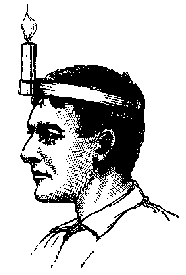 There is an old story of one who had lost his candle, and travelled all round his premises searching for it by its own light. It is told as a jest, and it must have been a mirthful incident where it happened. I remember an old gentleman who could see very little without spectacles, but went up and down the house searching for his glasses, looking through them all the time. The parable is this: a person full of doubts and fears about his personal condition before God is searching for grace within, by the light of that very grace for which he is looking. He is fearfully anxious because he can see no trace of gracious anxiety in his mind. He feels sad because he cannot feel sad. He repents because he cannot repent. He has the candle on his forehead, and is seeing by the light of it, and yet he is searching for that very light, without which he could not search at all. Many a time a man laments that he does not feel, and all the while he is overwhelmed with pain through the impression that he does not feel pain as he should.
There is an old story of one who had lost his candle, and travelled all round his premises searching for it by its own light. It is told as a jest, and it must have been a mirthful incident where it happened. I remember an old gentleman who could see very little without spectacles, but went up and down the house searching for his glasses, looking through them all the time. The parable is this: a person full of doubts and fears about his personal condition before God is searching for grace within, by the light of that very grace for which he is looking. He is fearfully anxious because he can see no trace of gracious anxiety in his mind. He feels sad because he cannot feel sad. He repents because he cannot repent. He has the candle on his forehead, and is seeing by the light of it, and yet he is searching for that very light, without which he could not search at all. Many a time a man laments that he does not feel, and all the while he is overwhelmed with pain through the impression that he does not feel pain as he should.
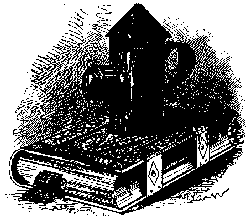 This bull's-eye lantern may be used as an illustration of how persons may have the best of light and fail to use it. See, I have shut it up, and no ray of light comes from it. I am told that, when the Bible Society first started, its agents were very diligent in calling round to see whether householders had Bibles or not. One of them called upon an aged person and said, "Please, madam, have you a Bible?" The excellent lady was astonished, not to say indignant, that persons should dare to come round, insulting respectable Christian people, and asking them whether they had a Bible. Of course she had a Bible. She would let the visitor see it wilh his own eyes, and then he would not think her a heathen any longer. "Mary, go upstairs and fetch the Bible from off the drawers, and let the gentleman see the large family Bible which my father left me." The volume was brought down, and laid upon the table; and when it was put on its baek, it opened itself naturally at a certaln place. "Ah!" said the venerable lady, "well, after all, I thiuk there is a providence iu your coming; for here are my spectacles which I lost years ago, and I could not imagine where they were." If she had not possessed a Bible, she would have thought herself a heathen; but., having a Bible and never reading it, she thought herself an exemplary Christian. Bibles which are never read are like lanterns which are never turned on. How shall we answer for our neglect at the last great day?
This bull's-eye lantern may be used as an illustration of how persons may have the best of light and fail to use it. See, I have shut it up, and no ray of light comes from it. I am told that, when the Bible Society first started, its agents were very diligent in calling round to see whether householders had Bibles or not. One of them called upon an aged person and said, "Please, madam, have you a Bible?" The excellent lady was astonished, not to say indignant, that persons should dare to come round, insulting respectable Christian people, and asking them whether they had a Bible. Of course she had a Bible. She would let the visitor see it wilh his own eyes, and then he would not think her a heathen any longer. "Mary, go upstairs and fetch the Bible from off the drawers, and let the gentleman see the large family Bible which my father left me." The volume was brought down, and laid upon the table; and when it was put on its baek, it opened itself naturally at a certaln place. "Ah!" said the venerable lady, "well, after all, I thiuk there is a providence iu your coming; for here are my spectacles which I lost years ago, and I could not imagine where they were." If she had not possessed a Bible, she would have thought herself a heathen; but., having a Bible and never reading it, she thought herself an exemplary Christian. Bibles which are never read are like lanterns which are never turned on. How shall we answer for our neglect at the last great day?
There is plenty of light in this lantern, but nobody sees anything of it; and here we have the portrait of many religious people who keep their knowledge to themselves. Oh, no, they never mention it; its name is never heard; they are tongue-tied professors. They pride themselves upon having plenty of Gospel light, but they never let out a ray; they never say a word for Jesus to the souls around them. Perhaps they think that their example is too valuable to need a word to be added to it; like the bell 'which was made of metal too precious to have a tongue put in it, and so could never be made to ring. Some folks are quite sullen in keeping themselves to themselves. If we try to turn on their bull's-eye, as I sometimes do, they are just a little hot, as this lantern has become. We have to mind how we handle them, or we shall burn our fingers. One who was gently spoken to, and urged to help a needy cause, replied crustily, "What I gives is nothing to nobody." Unconscious truth, no doubt, but said in a nasty way, making you feel as if you had tumbled backward upon a circular saw. It is my business to attempt with members of the church to turn on the light which is now shut up; and I hope you will therefore bear with my personalities, and not give me a warmer reception than you can help -- I refer to the kind of warmth which comes through a hot temper. Suffer me to exhort you. Is it not the Lord's will that you should shine? Is it not for your own comfort? May there not be souls waiting in the dark till you bring them the knowledge of the Saviour? Will you not remember Heber's missionary hymn, and practise its lesson? --
With wisdom from on high,
Can we to men benighted,
The lamp of life deny?"
Some seem to have a great capacity for denying light to their fellows. I have known persons almost glory in their reticence with their own children. "I never spoke to him about religion," was the complacent confession of an old professor as to his son. Some of these hide away in the dark themselves, lest they should be called upon to work. A prospectus of a Burial Club began, "Whereas many persons find it difficult to bury themselves." Alas! to my knowledge many persons bury themselves most easily, and one of my constant labours is to fetch them out of the sepulchre of their indolence. I wish they would respond to my call, and not lie in their coffins and grumble at my disturbing them. Again, dark lantern, I must turn you on!
 When we get the lantern pouring forth its brightness, or begin in earnest to study the Word of God, how cheering is the light! No man shall walk in darkness, who uses the clear shining of revelation. By this he shall see treasures, detect enemies, and discern his way. I am pleased to see Christian people like lanterns fully turned on. Should not our town and our age get all the light from us that we can possibly give? A friend who sits in one of the best seats, and is the owner of more than half a million of money, and puts a shilling into a collection, wants turning on to the full. A lady yonder, who has a first-rate education and remarkable fluency of speeeh, and yet has no work in the Sunday- sehool, or in thc Bible Classes, wants her light turned on also.
When we get the lantern pouring forth its brightness, or begin in earnest to study the Word of God, how cheering is the light! No man shall walk in darkness, who uses the clear shining of revelation. By this he shall see treasures, detect enemies, and discern his way. I am pleased to see Christian people like lanterns fully turned on. Should not our town and our age get all the light from us that we can possibly give? A friend who sits in one of the best seats, and is the owner of more than half a million of money, and puts a shilling into a collection, wants turning on to the full. A lady yonder, who has a first-rate education and remarkable fluency of speeeh, and yet has no work in the Sunday- sehool, or in thc Bible Classes, wants her light turned on also.
And so does my friend, Mr. Candoit, who, as yet, has more capacity for work than experience in it: when I think of what he might be doing, I am inclined to turn on to him to turn him on. Howevcr, I remember how hot I found the bull's-eye lantern just now, and I will let him alone. I do not wish to drive anyone into a service so honourable. In all gracious work give me spontaneous combustion. Those who do not wish to give light will never do so. So good-bye, dark lanterns! Before I quite part with you; I bequeath you this motto, ARISE! SHINE!